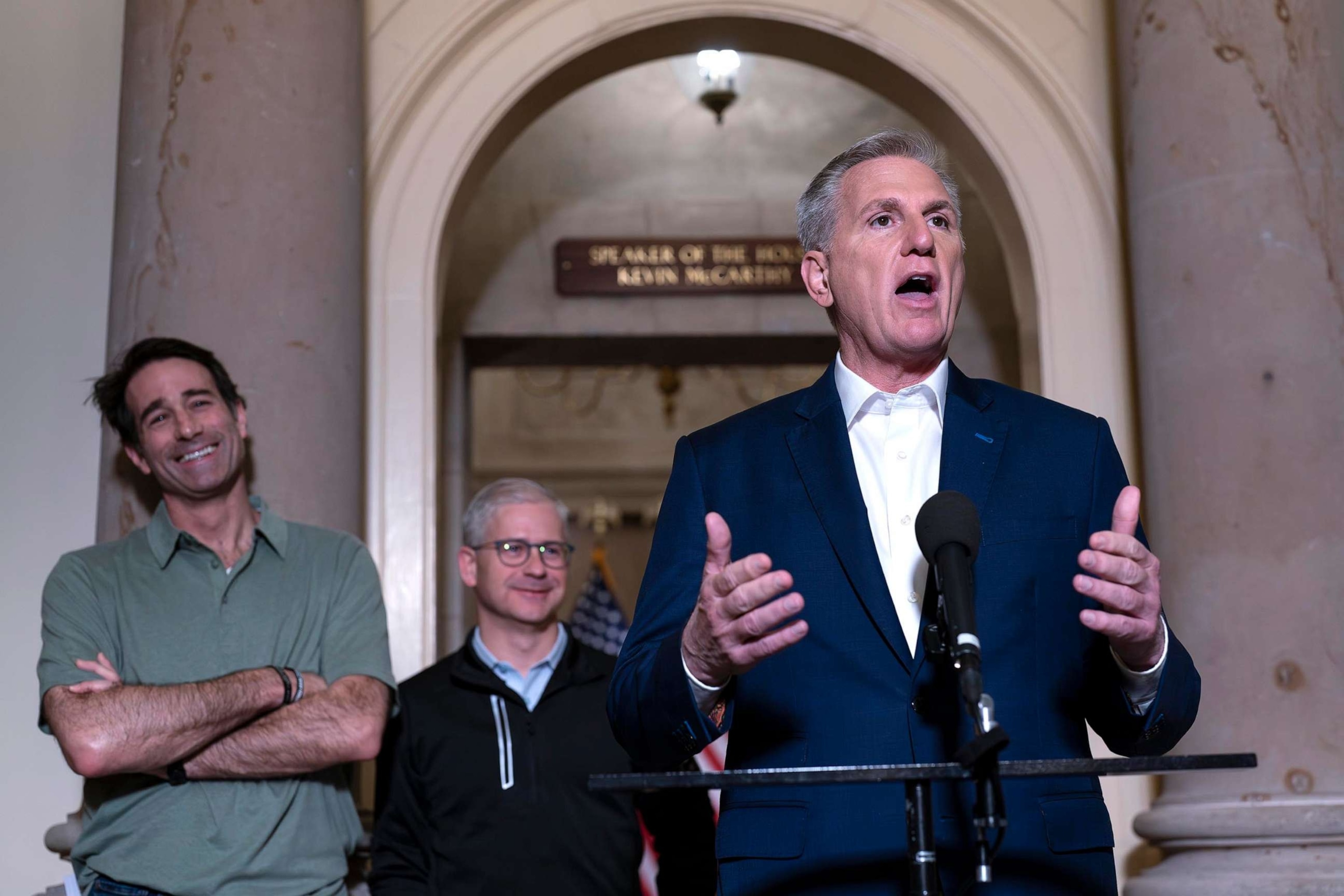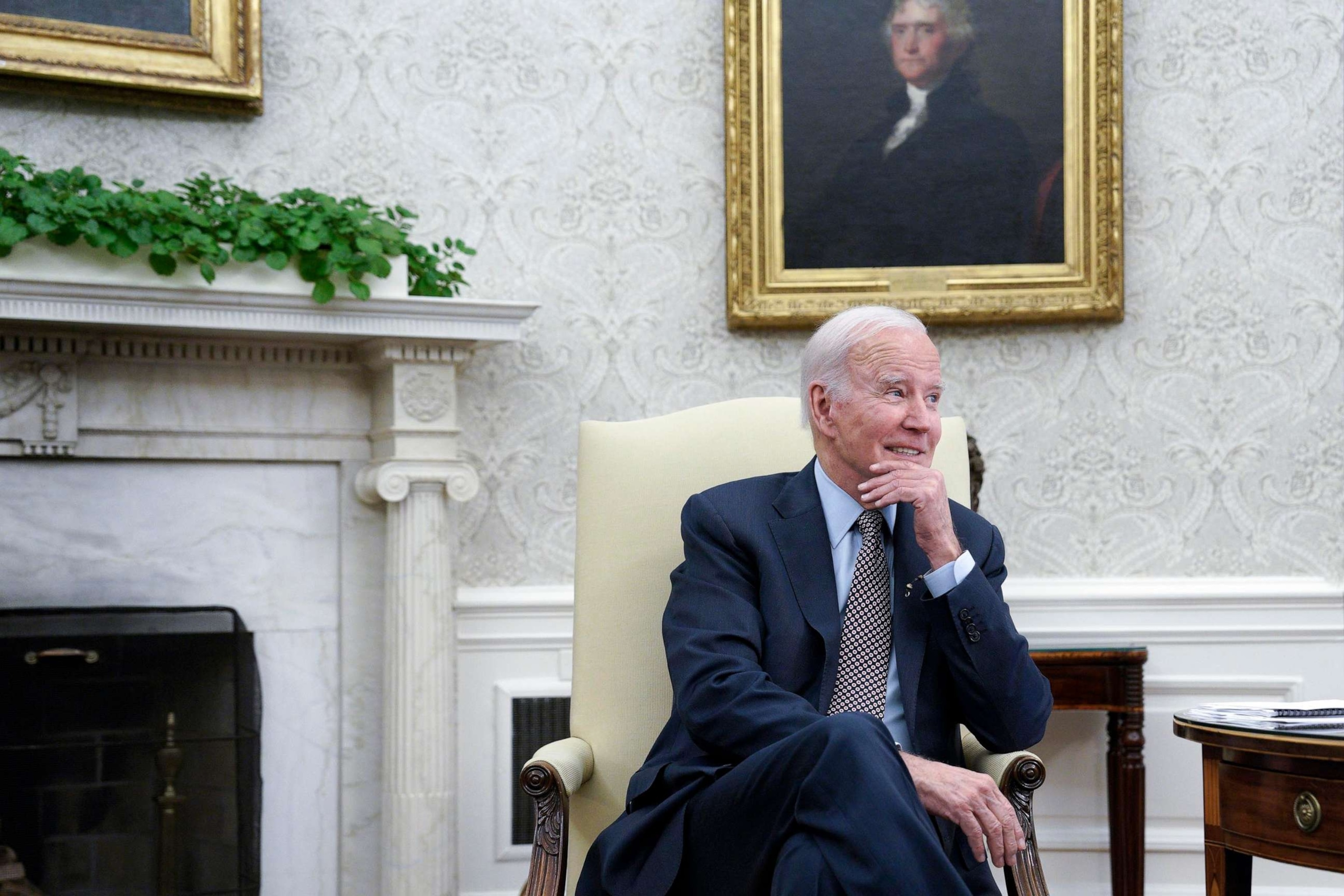Biden urges Congress to pass debt ceiling deal
The bill "doesn't get everything everybody wanted," Speaker McCarthy said.
President Joe Biden on Sunday night celebrated a bipartisan "compromise" to raise the nation's debt ceiling and avert a historic default that could upend the economy.
In a brief speech from the White House's Roosevelt Room, Biden urged Congress to move swiftly to pass the deal, brokered with House Republicans led by Speaker Kevin McCarthy, which also imposes some spending limits on the federal government and some regulatory and policy changes.
Treasury Secretary Janet Yellen has said the U.S. will run out of money to pay all of its bills as soon as June 5, known as the "X-date," unless the $31.4 trillion borrowing limit is raised.
The debt ceiling bill "takes the threat of catastrophic default off the table. It protects our hard-earned and historic economic recovery," Biden said.
"And the agreement also represents a compromise, which means no one got everything they want," he said. "But that's the responsibility of governing."
The agreement is a two-year budget deal that would also separately suspend the debt limit for two years, until Jan. 1, 2025, while keeping non-defense spending roughly flat with current levels in fiscal year 2024 and increasing by 1% in 2025.
Earlier Sunday, McCarthy addressed reporters outside his office on Capitol Hill and, like Biden, touted what he saw as wins in the legislation -- particularly the spending caps and policy changes such as adding work requirements to some federal aid programs and changing environmental regulations.
"This is a good, strong bill that a majority of Republicans will vote for," he told ABC News' Trish Turner.
And with Biden's backing, "I expect his party to be supportive as well," McCarthy said.
With a tight timeline to pass the bill and the House and Senate both narrowly divided, the president and speaker tried to cast the debt deal as successes for their respective parties -- an implicit reflection that moving forward quickly will likely require winning cooperation from Democrats and the GOP.

"This is a deal that's good news for, I believe you'll see, for the American people," Biden said.
The speaker sounded a similar note earlier Sunday.
"I think people will look back and say, 'Well I didn't get exactly what I wanted.' But there's something in here that -- it shouldn't be about you, it should be about America," McCarthy said. "America believes that we have spent too much, so this spends less."
He predicted then that a bipartisan majority of Congress would ultimately approve the 99-page legislation, which was publicly released on Sunday night, starting a 72-hour countdown that he has committed to members for reading the bill before a vote on Wednesday.
Senate Majority Leader Chuck Schumer said in a letter to Democrats on Sunday that he intends for his chamber to take up the proposal as soon as it passes the House -- though under the rules of the Senate, any one lawmaker could potentially delay a final vote until after the X-date.
Biden and McCarthy tout deal, push back on scrutiny
McCarthy, flanked by the two Republican negotiators who worked with him on brokering the debt and spending deal with the White House, spoke with reporters outside his office on Capitol Hill on Sunday morning.
He offered some specifics about the agreement with Biden while pushing back on criticism from his party's right flank that Republicans did not exact enough concessions on the federal government's budget.
The bill "doesn't get everything everybody wanted," he acknowledged, "but that's, in divided government, that's what we end up with."
During his remarks from the Roosevelt Room, Biden said the debt ceiling deal "protects key priorities and accomplishments and values that congressional Democrats and I have fought long for -- long and hard for."
Both he and McCarthy said the legislation would spur jobs, with McCarthy and his team saying the regulation changes would speed the pace of construction work, for example.
When answering questions from reporters, Biden defended his earlier position that the debt ceiling was "non-negotiable," given the negotiations that had just occurred.
McCarthy, outside his office, stressed that Republicans forced Biden to reverse his monthslong insistence that the White House would only negotiate on the budget separate from any increase on the debt, with Democrats claiming talks with Republicans under the threat of default were akin to economic hostage-taking and conservatives saying major budget changes were needed.
"It wasn't until the final two weeks that we were really able to sit down," McCarthy said.
At the White House, Biden maintained that his agreement on the budget was in fact separate from the debt, regardless of how it seemed.
When asked by ABC News' Elizabeth Schulze what he would say to fellow Democrats who feel he made too many concessions, Biden responded: "They'll find I didn't."
Appearing on Fox News on Sunday, McCarthy had said just the opposite: "There's not one thing in the bill for Democrats."
McCarthy and negotiators Reps. Garret Graves and Patrick McHenry, of Louisiana and North Carolina, deferred some details of the debt bill to the final text but singled out what they saw as major wins.
"This is the most conservative spending package in my service in Congress," McHenry, a 10-term representative, told reporters.

The speaker repeatedly praised both Graves and McHenry and Biden's team of "professional," "smart" and "tough" negotiators.
"The negotiations were intense, they were quite challenging," McHenry said. "The outcome of that is a fundamental shift in the spending trajectory in Washington."
As Biden said at the White House, the alternative to not addressing the debt ceiling could have been dire: "an economic recession, retirement accounts devastated, millions of jobs lost."
The government failing to pay all of its bills on time would undermine the credit of the U.S., which is a lynchpin of the international economy, and could delay payments on a swath of services including Social Security.
McCarthy, Graves and McHenry on Sunday pointed to changes to the National Environmental Policy Act, in particular, and said that while government spending on defense and veterans would increase under the deal, other appropriations would fall below the 2022 level.
McHenry highlighted "consequential" changes to the Supplemental Nutrition Assistance Program, also known as food stamps, and fixing "loopholes" in TANF, or Temporary Assistance for Needy Families, but he demurred on specifics until the bill text was published.
The deal has no changes to Medicaid and fully funds medical care for veterans. However, it raises the age from 50 to 54 for people who must work at least 20 hours a week to receive SNAP benefits. Those requirements are eliminated for veterans and homeless people.
When asked for an estimate on the net deficit reduction from the agreement, a White House official said discretionary savings are "likely" to be in the $1 trillion range.
Ultimately, McCarthy and his negotiators said outside his office, Republicans could not enforce a more sweeping, 10-year spending reduction into the next Congress because future lawmakers would simply be able to vote to undue it.
McHenry said that the bill instead lays out, as one example, $704 billion in annual non-defense discretionary government spending while "hold[ing] vets harmless" -- a rebuke of Democratic criticism that Republicans were seeking spending cuts that could affect veterans.
Graves said their legislation includes six years of spending caps, with different means of enforcing the first two years, under the current Republican House majority, than the remaining four.
The speaker was pressed several times by reporters on comments by some Republicans that the debt deal doesn't go far enough, especially in light of the Limit, Save, Grow Act that was passed along party lines in the House last month.
"This 'deal' is insanity. ... Not gonna vote to bankrupt our country. The American people deserve better," Rep. Ralph Norman, R-S.C., tweeted.
Sen. Rand Paul, R-Ky., likewise shared his displeasure on social media. "Conservatives have been sold out once again!" he tweeted.

McCarthy played down reports of in-fighting, insisting more than 95% of his conference had been "overwhelmingly excited" about the compromise during an earlier conference call.
"Let's let the members actually read the bill before they make a decision and go forward," he told reporters.
He also brushed off the potential risk of a snap vote to boot him from the speakership, which any single member could trigger under an earlier deal McCarthy made to win the gavel in January.
"Not at all," he said when asked if he was worried about such a move, known as a motion to vacate.
Early moves toward a vote
The GOP holds only a narrow majority in the House right now. Passing a debt compromise theoretically would require at least a bare majority of Republicans -- with enough Democrats to make up for any conservative defections.
In a "dear colleague" letter shared Sunday morning, House Minority Leader Hakeem Jeffries made no commitments about the scope of his caucus' support but struck an optimistic tone on raising the borrowing limit.
"I am thankful to President Biden for his leadership in averting a devastating default and look forward to our collective discussion," he wrote.
Senior White House officials immediately started calling a number of House Democrats to sell them on the deal, multiple lawmakers who have received the calls told ABC News. Aides to moderate Democrats were hoping for a "hard sell" from the administration.
Talking points circulated by the White House to members of Congress, and obtained by ABC News, encouraged lawmakers to focus on what the deal between Biden and McCarthy doesn't do, including further government cuts and changes to social programs.
Among Republicans, sources told ABC News on Sunday that the whip operation was well underway as well and a small group of members had returned early to Washington, reaching out to as many lawmakers as possible.
But House GOP leadership sources acknowledged that passing the deal will likely come down to moderate Democratic votes -- at the same time, the more Democrats that support the agreement, the more that may complicate things for Republicans, sources said.
McCarthy told reporters on Sunday that he had spoken to Jeffries multiple times and spoke with Senate Minority Leader Mitch McConnell on Saturday. He planned to speak with the GOP's Senate conference later Sunday to explain the agreement, he said.
In a statement Sunday night, McConnell praised the deal. "The agreement the Speaker reached with President Biden sets meaningful limits on the Administration's spending agenda. At the same time, it secures permitting reforms and reinforces the link between federal assistance and work," he said, in part. "The Senate must act swiftly and pass this agreement without unnecessary delay."
The speaker first announced a deal in principle on Saturday night, after weeks of talks with Democrats and a seesawing tone from both sides on the ultimate fate of any agreement.
Speaking Sunday night from the White House, Biden argued that the brinksmanship would not damage America's international standing: "We've been through this more than once, and it's just the nature of the way we handle the deficit and handle whether we're going to, each year, going to pay our debts. And it's happened more than once. It will probably happen again."
And though the president said he was examining whether, at some future point, to invoke the 14th Amendment to try and get around the ceiling, "I think it would cause more controversy getting rid of the debt limit."
ABC News' Katherine Faulders, Amanda Maile, Isabella Murray, Jay O'Brien, Lauren Peller, Elizabeth Schulze, Rachel Scott, Benjamin Siegel and Will Steakin contributed to this report.




